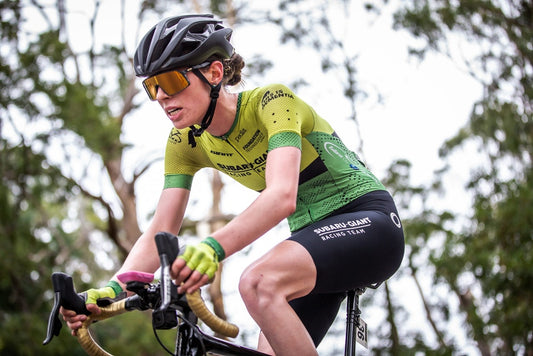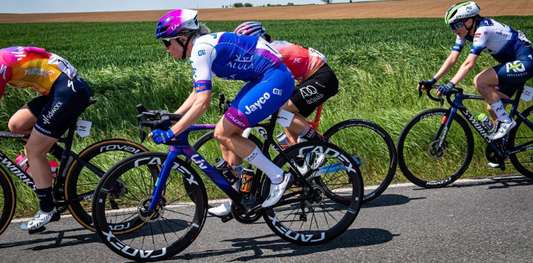SAMANTHA COPPINGER - WESTERN BULLDOGS FOOTBALL CLUB SPORTS DIETITIAN
We’ve been lucky enough to bring on-board Samantha Coppinger Accredited Sports Dietitian as our in-house expert on all things nutrition and hydration! In this blog, she walks through her experience in dealing with elite AFL Footballer's nutrition.
Sam is has worked with AFL footballers in the AFLW, Collingwood FC and now Western Bulldogs FC. We are very grateful to Sam for sharing her experience and professional insights as a Sports Dietitian with AFL Club Western Bulldogs.

Sam's Journey To The AFL
I have loved AFL since I can remember. I grew up going to every Essendon game with my family and watching any game of AFL on TV that I could, I just loved the game. When I was 16, I completed work experience at Essendon Football Club with their Sports Dietitian for school. It was this experience that made me realise I wanted to be a Sports Dietitian at an AFL club.
My experience includes working with numerous sports including State Netball teams, Melbourne Victory NPL teams, elite basketball and many individual sports including athletics and IRONMAN athletes.
My experience in football began at Williamstown Football Club in the VFL when I graduated from University. I worked for Williamstown for 5 years where I developed my skills and learnt the workings of an elite football club. For the 2019 AFL season I worked at Collingwood FC in a maternity position as their sports dietitian, and the end of the 2019 season I was lucky enough to gain employment at the Western Bulldogs FC which I am absolutely loving.
What's A Day In The Life Of An AFL Sports Dietitian?
On a daily basis the key aspects I deal with include player education. Educating players on all aspects of nutrition is extremely important. Even though some may have been an elite athlete for a long period of time, there is always areas for improvement. Menu planning and catering is another large part of my job. Planning menus for training, snacks for training and travel and home and away games to ensure players get the appropriate nutrition. Other daily tasks include individual nutrition plans for players, overseeing the supplement program, body composition testing and management and snack and meal preparation.

What Are The Main Challenges Your Athletes Face?
The main challenges the athletes I work with face include knowledge around nutrition and hydration and putting it into practice. Education is so important when it comes to athlete nutrition. Constantly updating their knowledge on different aspects of nutrition so they can make any necessary changes to their diet with my guidance. The nutrition space is constantly changing and adapting so I need to help my athletes follow accordingly. Providing athletes with as much support as possible including cooking classes, recipes, supermarket tours, meal ideas and many interactive education sessions is the best way to overcome these challenges.
Supplements are definitely a challenge for athletes. The biggest challenge is new food products coming onto the market that contain supplements such as protein powders. Educating athletes in regards to reading food labels and understanding what they can and can’t have is really important.
What Are The Benefits To Getting Nutrition Right?
We see numerous improvements when athletes make positive changes through nutrition and hydration. Increased energy is a major improvement we see that benefits an athlete's performance. Improved recovery and immunity is also seen when athletes make improvements to their nutrition and hydration. We see positive changes to body composition which includes decreased body fat and/or increased or maintenance of muscle mass. Changes also allow athletes to get through games without cramping or discomfort.

What Are The AFL Standard Nutrition Protocols Throughout Each Phase Of The Season?
Pre-season training:
– Heavy training loads
– Combating fatigue
– Backing up training
During pre-season our players have their highest workload. During this phase of the season they have the highest energy requirements with carbohydrates being of high priority. Our main focus during pre-season is fuelling for training, recovering optimally to allow players to back up training sessions and following hydration protocols. As our pre-season is completed during summer, hydration plays a major role. The warmer conditions often mean increased sweat rates which equals greater fluid and electrolyte losses. This was when I saw the benefit of trialling PREPD with my athletes. During pre-season I focus on helping individual players with their nutrition and hydration practices to set them up for the season ahead and help them achieve their goals.
In season training:
– Week leading into a game – Daily guideline for nutrition & hydration
The week leading into a game I recommend players eat to their training load. On a higher training day they require additional carbohydrates compared to a light training session or a rest day where they require a smaller amount. As a general rule, on a rest day I recommend players following a plate model of ¼ carbohydrates, ¼ protein and ½ plate vegetables. On a higher training day players would increase their carbohydrate portion to ½ a plate and reduce their vegetable portion to ¼ plate.
– Pre-Game – Importance of preparation 24hrs before & do you take any measurements, weight, urine sample, etc.
Player preparation is extremely important prior to a game. The timing of their meals prior to a game is important to prevent any gastrointestinal discomfort and to ensure optimal energy levels for the game. I give players general recommendations relating to when they should consume their pre-game meals and snacks, but their timing is very individual. I work closely with each player to determine what works well for them and make any necessary changes. The day prior to a game we take a urine sample. The urine sample allows us to test their hydration levels and gives the players enough time to make any necessary changes before the game if they are dehydrated. Prior to warm up all players are required to record their weight. After the game all players will do the same. This allows us to see how much weight a player has lost during a game. This is all hydration losses the player has experienced. Every 1kg of body weight lost, is 1.5L of fluid the player needs to replace. Taking the players weight allows us to know how much fluid each individual player needs to replace for optimal recovery.
– In-Game – Fuel / energy supplements + hydration strategies.
In-game the players use a range of hydration drinks including water, cordial, Powerade and Koda / Shotz. Every player has different preferences for what they like to drink during a game, with some players preferring different drinks depending on the time of the game. Pickle juice is used during games to help prevent/stop cramping. Players swig the pickle juice in the throat and a message is sent to their muscle to stop cramping. Energy gels are used in all games by some players to provide additional energy. Gels provide a liquid form of glucose to help top up energy levels during a game.
– Post-Game – Recovery aspects / measurements.
Post-Game the nutrition focus is on the three R’s. Refuel, repair and rehydrate. Refuel with carbohydrates to replace depleted energy stores, protein to repair damaged muscles and fluid and electrolytes to replace fluid losses. Our aim is for the players to have a snack within 30-60 minutes of finishing the game. We also recommend players have a meal within 2 hours of completing the game to help follow the three R principle.

What Benefits Have Your Players Seen Since Using PREPD?
I had a few players who were struggling with hydration. They would do all of the right things but still lost large amounts of fluid during a game and had issues with cramping. I wanted to look outside the box and see what else I could do to help these athletes. I came across PREPD in some studies and decided to give it a try. The biggest benefit my athletes found with PREPD was the reduction in fluid losses during a game.
The players responded really well to the PREPD powder. I trialled it with a select group of players who had tried PREPD previously but didn’t like the texture or consistency. These players responded much better to the PREPD powder. They mixed the powder into a smoothie which they found much easier to drink. We saw the same results as PREPD but offering another option proved beneficial.
What Are The Benefits Using PREPD Recover Powder Post Exercise?
The benefits of consuming the PREPD Recover powder is that it contains added protein. The added protein and leucine make it a great recovery drink as this will help with muscle repair and recovery post exercise as well as hydration. It is beneficial to have it all combined into one product as athletes don’t have to drink many different products to get the same benefit.





